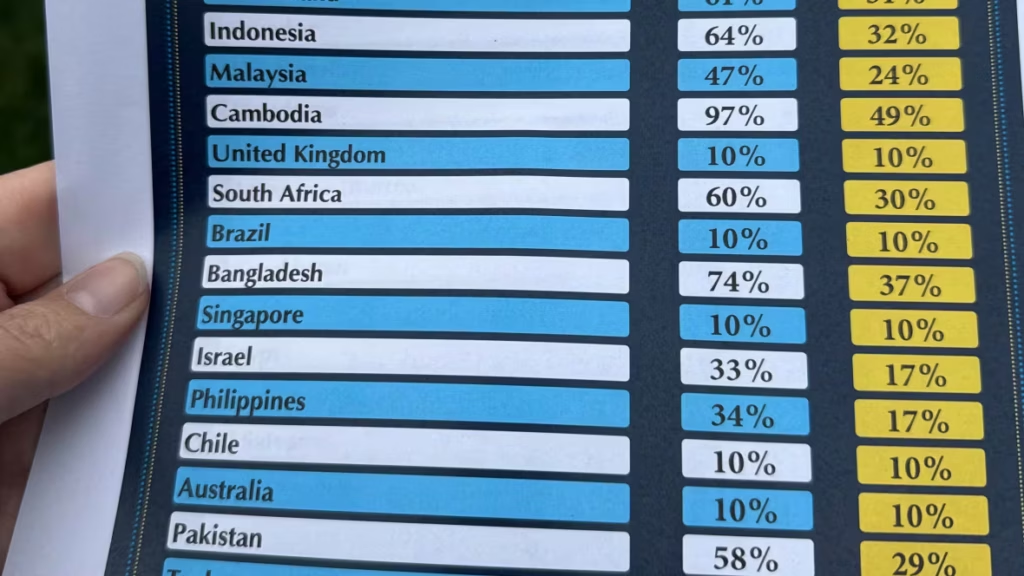Trump’s wide-ranging tariffs have sent shockwaves through global stock and commodity markets. Discover how these actions are affecting economies and global trade.
Introduction
In an unprecedented move, former U.S. President Donald Trump imposed wide-ranging tariffs on a variety of goods, triggering a massive shock to the global economy. The new tariffs impacted stock markets and commodity prices, causing severe volatility and uncertainty. This article examines the economic repercussions of Trump’s tariffs, their effects on global trade, and how markets are adjusting to these changes.
The Impact of Trump’s Tariffs on Global Markets
Stock Market Volatility
The announcement of Trump’s tariffs sent shockwaves through global stock markets, with major indices experiencing significant declines. Investors reacted with fear of a potential trade war, causing widespread sell-offs in stocks. The U.S. stock market, in particular, witnessed a series of sharp fluctuations, while European and Asian markets followed suit, showing signs of distress as trade uncertainties intensified.
Commodity Prices in Freefall
Trump also had a profound impact on commodity markets. The prices of metals such as steel and aluminum spiked initially, as the tariffs increased production costs for manufacturers. However, other commodities like oil and agricultural products faced price declines due to concerns about reduced demand resulting from global economic slowdowns. This created a ripple effect in industries reliant on raw materials, leading to cost-push inflation in several sectors.
Trade Wars and Diplomatic Tensions
it not only an economic blow but also a source of escalating diplomatic tensions between the U.S. and its trading partners. Countries such as China, the European Union, and Mexico retaliated with their own tariffs on U.S. goods. This tit-for-tat escalation raised concerns about the possibility of a full-scale trade war, which could further disrupt global trade flows.

How Economies are Responding to Tariff Impact
Short-Term Economic Disruptions
In the short term, businesses and consumers have felt the brunt of the tariffs. Higher import costs led to price increases on a variety of goods, from electronics to household items. For industries that rely on imported raw materials, the increased costs reduced profitability, forcing companies to rethink their strategies.
Long-Term Consequences
While the immediate effects of the tariffs were disruptive, the long-term consequences may be even more severe. Reduced trade could slow global economic growth, leading to lower investment in emerging markets. Moreover, countries might seek alternative trade partnerships, further fragmenting the global market into regional blocs, and possibly undermining the existing international trade system.
Global Trade Shifts and Adaptations
China’s Strategic Moves
China, one of the most affected countries by Trump’s tariffs, has sought to mitigate the impact by diversifying its trade partners and increasing domestic production. The Chinese government has also invested heavily in technology and infrastructure to boost its self-sufficiency and reduce reliance on foreign goods.
Europe’s Resilience
Europe, similarly, adjusted its approach by focusing on intra-regional trade and forging new trade agreements outside of U.S. influence. The European Union has been vocal about the need to protect its trade interests, and its policy measures have reflected an attempt to shield itself from the adverse effects of the tariffs.
Why Trump’s Tariffs Were a Game Changer
Shift Toward Protectionism
Trump’s tariffs marked a significant shift toward protectionism, a departure from decades of global economic cooperation. By imposing tariffs on key industries, he aimed to protect American jobs and reduce the trade deficit. However, this strategy also exposed the vulnerabilities of interconnected global supply chains and exacerbated the economic divide between nations.
A Precedent for Future U.S. Trade Policy
Trump’s actions set a precedent for future U.S. trade policy, with some advocating for a more isolationist approach to safeguard domestic industries. The debate surrounding tariffs continues to be a divisive issue in U.S. politics, with proponents of free trade calling for a return to open markets and opponents pushing for more stringent protectionist policies.
Conclusion
The imposition by Donald Trump created an economic shockwave that affected stock markets, commodity prices, and global trade dynamics. While the long-term impacts remain uncertain, it is clear that the global economy has undergone significant changes as a result of these policies. Countries are reassessing their trade strategies and adapting to the new landscape, and businesses are looking for ways to survive in a more protectionist world.
Internal & External Links:
Hashtags:
#TrumpTariffs #GlobalMarketShock #StockMarketImpact #TradeWar #CommodityPrices #EconomicDisruptions #Protectionism #GlobalEconomy